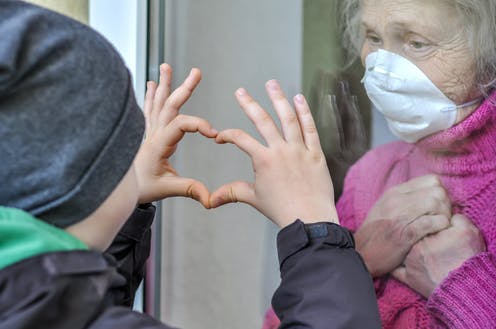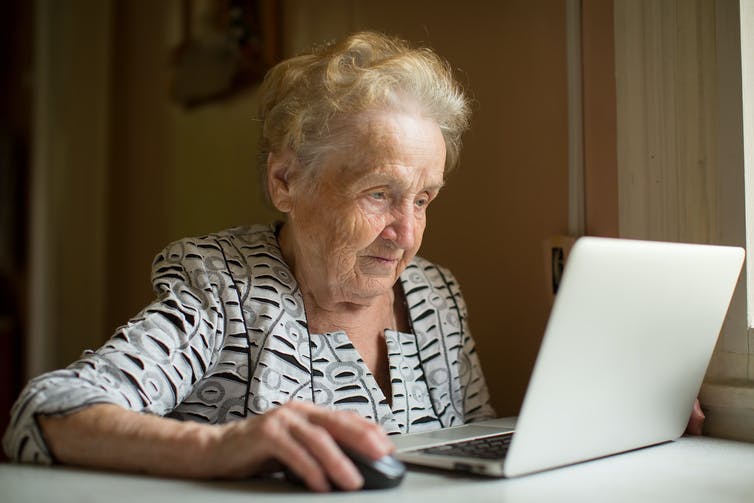
The devastation brought by the Omicron variant on long-term care (LTC) homes in Ontario is rampant as numerous staff and residents test positive for COVID-19.
Due to the rise of Omicron, Ontario added new restrictions to LTC homes that resulted in a ban on general visitors and day absences for residents for social purposes. Long-Term Care Minister Rod Phillips reinforced the necessity of these policy changes as LTC facilities are home to a “very, very vulnerable group of individuals.”
Although this current LTC lockdown was implemented for the safety of residents, experts remain concerned, family members feel livid, staff battle sheer exhaustion and residents continue to suffer from not only sickness, but also social isolation and loneliness.
Social isolation and loneliness remain an epidemic amplified by the pandemic, especially in LTC.
Read more:
Loneliness could kill you
My PhD dissertation looks at social isolation and older adults, with a particular focus on how the pandemic exacerbates feelings of isolation and loneliness. I currently work on the frontlines in an LTC home experiencing a massive outbreak. I am exhausted from how short-staffed we are, and fear not only contracting the virus and spreading it to other residents, but bringing it home and spreading it to my family.
My own anxieties aside, LTC workers, including me, recognize the negative impact the pandemic has had on residents’ mental health, spirit and overall well-being. We nevertheless recognize that confining residents to their individual rooms is seemingly the only way to minimize the transmission the Omicron variant. This restriction, however, comes at a great cost to residents.
Social isolation, loneliness: An LTC epidemic
Though mandated isolation keeps residents safer, companionship, emotional support, in-person contact and social engagement — the human elements of LTC — are currently near to non-existent. Combined with the poor health, cognitive impairment and psychological distress that can be experienced by residents, the risk of social isolation and loneliness is painful. It is one of the biggest social problems of our time, and the lack of social connectedness introduces a whole host of other detrimental health outcomes.
Social isolation in older adulthood is associated with increased mortality, poorer self-rated health, lower quality of life and greater risk of dementia.
LTC residents need social connection. While face-to-face interactions are always preferable they’re currently not fully possible unless you’re an essential family caregiver. But there are ways to nourish our social appetites during a pandemic.
To address this crisis of connection experienced by residents, LTC workers are doing what they can to engage their residents socially. We sing, play music, show movies, provide updates and engage in as much conversation as we can to keep residents’ spirits high.
Even so, with Omicron affecting more than 30 per cent of LTC staff, we need family members and friends now more than ever to help residents stay connected and feel less lonely and isolated.

(Shutterstock)
10 things you can do
If your loved one is currently living in a LTC home facing an outbreak, here are some things you can do to make sure they don’t feel totally alone:
-
Get in touch with the LTC home’s recreation therapist to let them know what kind of music, TV shows or movies your loved one enjoys.
-
Drop off a smartphone, iPad, tablet, portable DVD player, iPod, etc., so your loved one can stay entertained and connected.
-
Chat on Facebook Messenger, Skype or e-mail.
-
Write them a letter. Offer words of affirmation and encouragement. Remind them how resilient they are and that better days are coming. Be there for them and let them know they have your support.
-
Schedule phone calls and video chats with your loved one.
-
Schedule a phone call even if your loved one doesn’t have a phone. Every LTC home has a land line, either for the charge nurse or for management (or both); it can be brought to their room (sanitized before and after).
-
If you’re an essential family caregiver and you feel comfortable, book a visit to see your loved one. Phillips allows family caregivers in LTC homes to ensure that “vital connections to family and friends are still available.” Each home will provide you with the necessary personal protective equipment (PPE) that you need.
-
Do a window visit. Come to your loved one’s window and bring written signs telling them how you much you love them and can’t wait to see them soon.
-
Drop off their favourite snacks (something sealed and wrapped so it can be wiped down, like a bag of chips or chocolate bar).
-
Drop off old family photos, puzzles, colouring books or anything meaningful.
Doing any of the above is a massive help for both staff and residents in LTC. Please remember to exercise patience and kindness when dealing with staff, we are doing our best.
Communication is truly key in such challenging times and your presence — either virtually or through the window — is very needed.
![]()
Victoria Atabakhsh does not work for, consult, own shares in or receive funding from any company or organisation that would benefit from this article, and has disclosed no relevant affiliations beyond their academic appointment.























